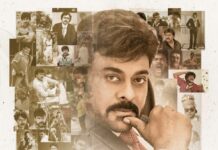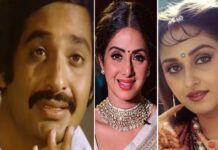
NOTE: Rajan of Raja-Nagendra duo is no more. He passed away on Sunday (October 11, 2020). We are reproducing the interview we had done earlier.
chinukula raali nadulugaa saagi…(Naalugu Stambhaalaat)..
nee kaLLalO snEham…(Prema Khaidi)..
eDaarilO kOyila…(Panthulamma)..
naagamallivO, teegamallivO…(Nagamalli)…
The list of songs that hit the mind gets reminded of goes on when one thinks of the music director duo Rajan-Nagendra. Though they worked for lesser films in Telugu than in Kannada, Telugu audience will remember the duo forever. It was hard to trace Rajangaaruwho lives in Bangalore, and I’d save our readers the long story of my attempts to trace him at his residence. Born in 1933, Rajan gaaru is 75 now, but he’s still young at heart and engages himself in yoga and morning walk regularly without fail. Here are the excerpts of the interview with Sree Rajangaaru, exclusive to TeluguCinema.Com:
Sri: I heard that your father was also a music director for silent (mookie) films. (When silent films were screened, there used to be a storyteller and a music troupe to provide story and other details to the audience, and to provide audio backing to the scene. Actor Kasturi Sivarao was very popular at that time for this job in Telugu.)
Rajan:Yes, my father Rajappagaaruused to provide music score for silent films, but I haven’t seen any of those. Talkies were already popular by the time I was a child, and thus I never got a chance to see my dad scoring music for films (laughs). He was a very good musician and used to play harmonium and flute very well. Sree Bidaram Krishnappagaaru, a great musician himself, used to live near our house and so our father sent us to him to learn more from him. We used to accompany him whenever he was performing. I was more interested in violin, tabla, and veena while Nagendrappa (Nagendra) was more interested injal tarang. I also learned flute but I was not a master at it; I obtained a degree in vocal music. Nagendra went to Bangalore in 1941 and got admitted in S.L.N. School near K.R. Market. He was also joined in Jai Maruthi, a music school. Then, he joined in the orchestra there only which is linked with the orchestra of the Raja (King of Karnataka).
Sri: So, how did your first break happen in films?
Rajan:I got an opportunity to sing in Chennai, and I went there with my brother. Most shootings back then happened in Chennai. We worked under Sree H.R. Padmanabha Sastrygaarufor some time. Nagendra got an opportunity to provide music in Sree Padmanabha Sastry’s film…
Sri: When was that?
Rajan:It was probably around 1947. We were both still very young and didn’t know much. We thus came back and completed our matriculation in 1951 from Bangalore. We later joined with Sree P. Kalinga Rao, a very famous radio artiste at that time. Nagendra also got an opportunity to sing for a movieSreenivasa Kalyana(along with the famous Hindustani singer Ameer Bai).
Sri: How did the first break happen as a music director?
Rajan:After completing matriculation, we started interacting with a lot of film people. As Nagendra was already in the music troupe giving programs, he got introduced to Mr. Dorai and Mr. Sastry who were making a film. And, it was then that he was also introduced to Vithalacharyagaaru. Thus, we signedSowbhagya LakshmiandChanchala Kumariat almost the same time. It was Vithalacharyagaaruwho gave us more encouragement and continuous opportunities both in Telugu and Tamil.
Sri: With Vithalacharyagaaru, you gave some good musical hits likeKanakadurga Puja Mahima,Aggi Dora,Madana Kamaraju Katha, and with G. Vishwanatham, you gaveAakaasha Ramanna, and others. I heard Vithalacharya paid lesser than other directors. Is that true?
Rajan:(Laughs) It’s not with money we worked but with creativity! We want to have a good name when compared to more money. He was the one who gave us the first break and we were ready to work for him even for zero remuneration!
Sri: You entered the Telugu filmdom in late ’50s withKanakadurga Puja Mahimaand worked continuously for Vithalacharya gaaru until the ’70s, but I guess you didn’t get a lot of recognition untilPanthulammahappened.manserigina vaaDu maa dEvuDu…,mallelu kurisE challani vELalO…,eDaarilO kOyila…,sirimalle neevE…,maanasaveeNaa madhugeetam…from that film were all great hits of the time!
Rajan:True, and the credit goes to ‘Navata’ Krishnam Rajugaaru. It was he who insisted on us doing the music for the filmPanthulamma. That film was a big musical hit (and an average at the box-office, though) and got us the Nandi Award too for that year. After that film, we did films likeIntinti Ramayanam,Naalugu Stambhaalaata,Raju-Rani-Jackie,Nagamalli,etc.in that banner which were also all-time musical hits.
ri: I think you went really well with Singeethamgaaruand Jandhyalagaaru!
Rajan:AfterPanthulamma, we worked with SingeethamgaaruforSommokadidi-Sokokadidi,Chelisuva Modagalu(Kannada, 1982), andRaju-Rani-Jackie, and all were good musical hits. With Jandhyalagaaru, we didMoodu Mullu,Rendu Rellu Aaru, andChoopulu Kalisina Subhavela, apart fromNaalugu Stambhaalaata.
Sri: When you worked forMoodu Mullu, you have not lifted any of the original songs from the Tamil version. (The Tamil version ofMoodu Mulluhad music by Ilayaraja; the film was later dubbed into Telugu asVaddante Pelli.) However, for Vamsy’sManchu Pallaki, you used the original tune for the songmEghamaa dEhamaa…Any particular reason?
Rajan:We did not want to use the same tune even for that song, but we had to do it upon insistence by the producer and director. Actually, even that tune is not originally scored for the Tamil film – it was taken from a ghazal.
Sri: I believe you reused many of your hit tunes from Kannada in Telugu again, in different films.
Rajan:True, I do agree that we used many of our Kannada hits in Telugu too…
Sri: Compared to Kannada or Telugu, you worked very less in Tamil, Malayalam, and Sinhalese…
Rajan:That’s true. After Kannada, we did more films in Telugu… around fifty to seventy films, as far as I can remember, but I do not remember the exact number. In Tamil, we did very less films but most of our Telugu films for Vithalacharyagaaruwere dubbed in Tamil too. Kamal Hasan’sSommokadidi-Sokokadidi, for which we scored the music, was dubbed into Tamil and was a good hit too. The last film we did in Tamil wasVeettukku Veedu Vaasappadi(a remake ofIntinti Ramayanam). Though we did only one straight film in Malayalam (Mrigasalayil),Panthulammawas also dubbed into Malayalam asTeacher. We only did one film in Sinhalese, and one each in Tulu and Konkan too.
Sri: I heard that you got the legendary singer Kishore Kumar to sing a Kannada song?
Rajan:Yeah, Kishore sang for the Kannada filmKulla Agent 000. We wanted to have a peculiar voice not familiar in Kannada. I have a friend who is close to Kishore Kumarji, and thus we approached the singer through the common friend, sent the lyrics in Hindi much before the recording, went to Bombay and made him rehearse the song before recording. …It was a pleasure to work with him.
Sri: Heard you did some songs for T.V. too…?
Rajan:We did only a title song for the television serialAbhimaanafor Udaya TV channel.
Sri: There were allegations of you cheated your brother financially and he died a pauper in a general hospital with Rs. 141 as bank balance in his last days…
Rajan:Those allegations were utterly baseless! He died in the general hospital – that’s the only truth there and the rest is all baseless. His family still owns a house each in Chennai and Bangalore. His wife is a school principal and you can verify this information with her.
Sri: Tell me about your family..
Rajan:I have a daughter and a son. My son Ananth is also a music director in Kannada.
By Sri Atluri
About Late Nagendragaaru:
Nagendra was also a singer. He sang many songs in Kannada, mostly for comedians. He sangyaaru yaaru nee yaaru…(Rathna Manjari),Driving maaDtiyaa yE kullaa…(Kulla-Kulli),nammoora santheli…(Gaali Maathu) and many more. Nagendra was admitted in the Bowring Hospital for treatment of hernia in August 2000. He later developed complications because of his high blood pressure and diabetes conditions. His wife, carrying lunch for him when he was recuperating, couldn’t reach the hospital because of the bandh on September 28, 2000, prompted by Rajkumar’s kidnapping by Veerappan. Nagendra’s condition got worse and he suffered a stroke.
According to tabloids, he was in deep financial stress when he was joined in the hospital and reportedly told his wife that he preferred a general ward, and that she should not seek help from the government. A minister of state of Karnataka offered to provide free medical treatment to Nagendra, but he passed away on November 04, 2000 before it materialized. Some singers and composers visited him at the hospital but there were no signs of any help from any of them. (His wife says he refused any charity.)
In Karnataka, their songs are requested the most on All India Radio, bringing in more royalties for recording companies than to any other composers. Nagendra is survived by his wife, his mother, and a 12-year-old son.






